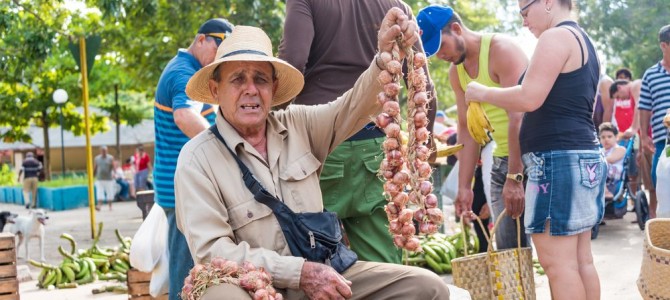When Barack Obama dined at Castro’s in Havana, it may not have occurred to him that the vast majority of Cuba’s people are undernourished, and that keeping Cubans scrambling for their next meal is an essential part of the Castro regime’s hold on power.
Ordinary Americans may be forgiven lack of empathy with hungry Cubans because our abundance makes it difficult to comprehend the opposite. But Obama knows access to food is the Cuban people’s most pressing daily preoccupation and that many come up so short that, according to the U.S. National Institutes of Health, malnutrition is the plurality cause for hospital admissions in Cuba (41 percent). He also knows that controlling access to food is the key to the prison that is Castro’s Cuba.
But ideological solidarity with the Castro regime enabled Obama to suppress the normal revulsion to eating one’s fill while surrounded by fellow humans whose bellies growl.
To Control Food Is to Control Life
Obama’s socio-political tribe has admired the Castro regime from its inception, envying its power to reshape society along common Progressive lines. The degree to which modern progressives yearn to do to America what Castro has done to Cuba may be seen in their lack of objection to, indeed support of, the Castro regime’s power to choose who will eat well and who will live on the edge.
It is a cruel power. If an ordinary Cuban tries to fend off hunger by growing his own food or just by casting a hook into the surrounding sea, he risks falling afoul of the regulations by which the regime surrounds food, violations of which it judges arbitrarily and that can land you in a labor camp. That is because cooperating with others to grow or trade food is, effectively, to subvert the regime’s control.
Fishing is strictly limited. Slaughtering an animal is punishable by eight years’ imprisonment, and buying a piece of illegally slaughtered meat gets you three. Of course, millions of people in the countryside do such things, while city dwellers try to build connections with country folk who can deliver contraband. Minor officials collaborate by taking bribes. But this endemic corruption is as dangerous as it is essential to life.
As a result, most of the population is thrown back onto the official food system: the ration book, controlled by the Communist Party’s neighborhood committees, whose coupons can be redeemed at state food stores. This entitles the holder to six pounds of rice, a pound and a half of beans, 15 pounds of potatoes or bananas, a pint of cooking oil, six pounds of sugar, and a half-pound of beef (or a pound of chicken) per month.
This supplies about a third of a person’s nutritional needs at a price that takes up about 20 percent of the average monthly salary in the pesos with which most Cubans are paid. After paying for one’s ration book foods, the ordinary worker is left with the equivalent of about 15 U.S. dollars per month in these ordinary pesos.
Suck Up to Your Dictator If You Want to Live
Supplying the remaining two-thirds of one’s calories from open markets with that sum is a bitter task. Lots of food is available there, either requisitioned from farmers, purchased from abroad (Cuba now has to import even sugar!) or donated by international relief agencies. But prices in these markets and other stores in the parallel economy are as high or higher than in the United States.
Moreover, these upscale shops accept only so-called “convertible pesos,” reserved (except for persons who receive money from relatives in the U.S.) for regime favorites through jobs that are accessible only through the regime. When ordinary people try buying “convertible pesos” with ordinary pesos, they find out just how worthless these are. That is why keeping body and soul together is an all-consuming problem for most Cubans.
For U.S. progressives, however, the Cuban diet is part of what they find romantic about the regime. even chic. (See Bill McKibben’s “The Cuba Diet: What you will be eating when the revolution comes,” Harpers 2005.) Concerned as so many in this overfed ruling class are with reducing their body mass index—Michelle Obama most prominently—they fantasize about its benefits. The rest of us might be forgiven for fantasizing about how they might feel if ever they stopped dining with the tyrants and spent some time suffering their subjects’ lot.
But, since Obama and fellow progressives identify with the oppressors rather than with the oppressed, their “opening to Cuba” will let U.S. companies become junior partners with the regime’s activities on the island. The regime will control who is employed by whom, for how much, and under what conditions.
In short, since Obama’s initiatives will channel U.S. money exclusively through the Castro regime, they can only increase the incentives that Cubans already have to seek their fortunes, and their food, through those channels.









